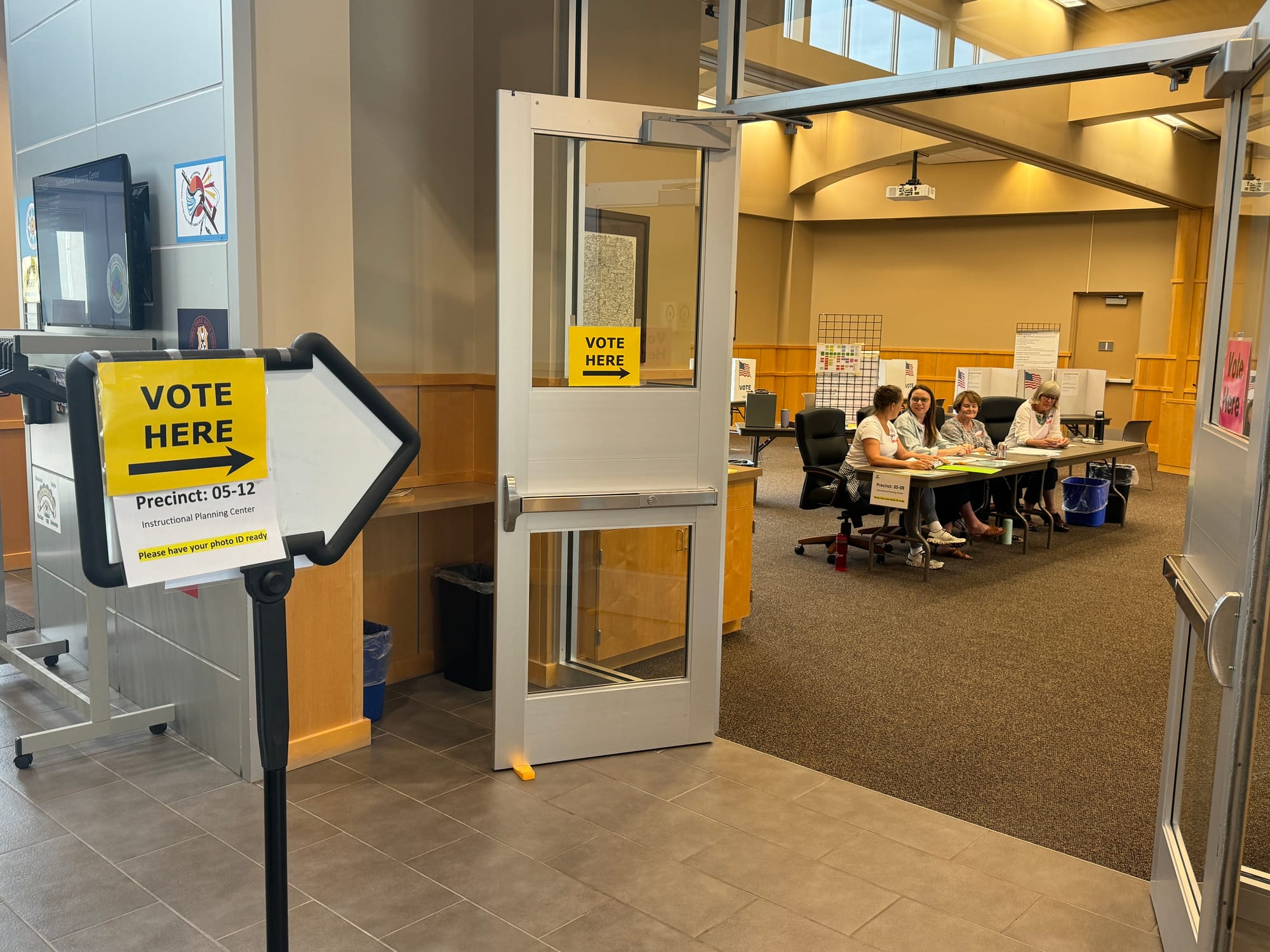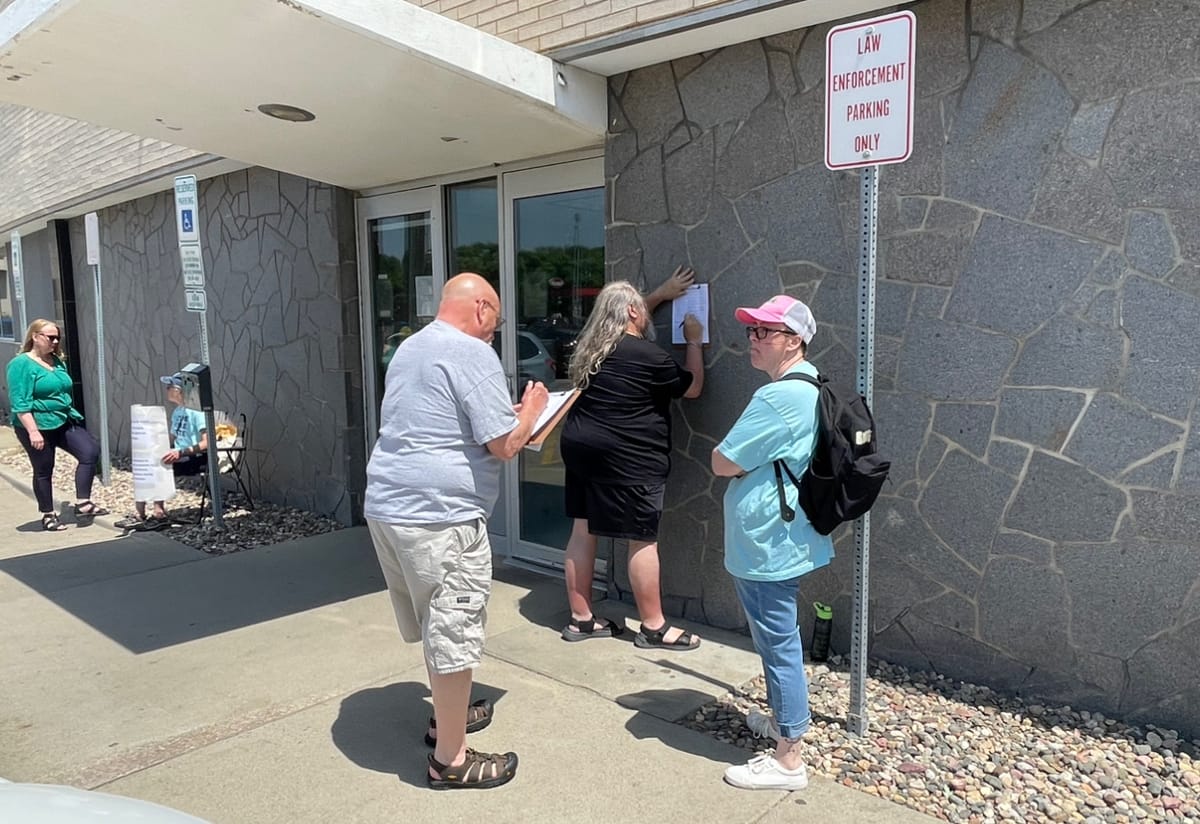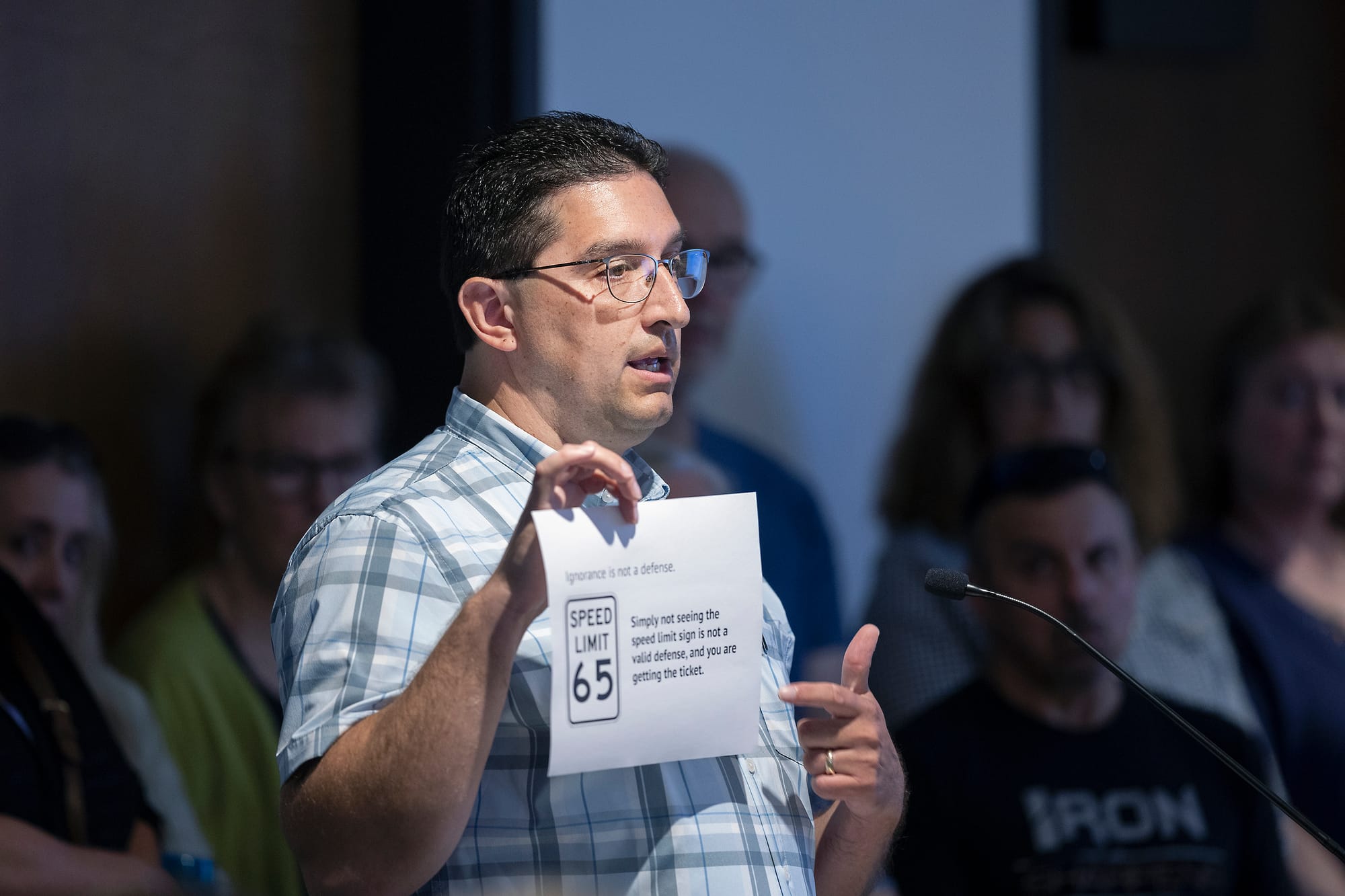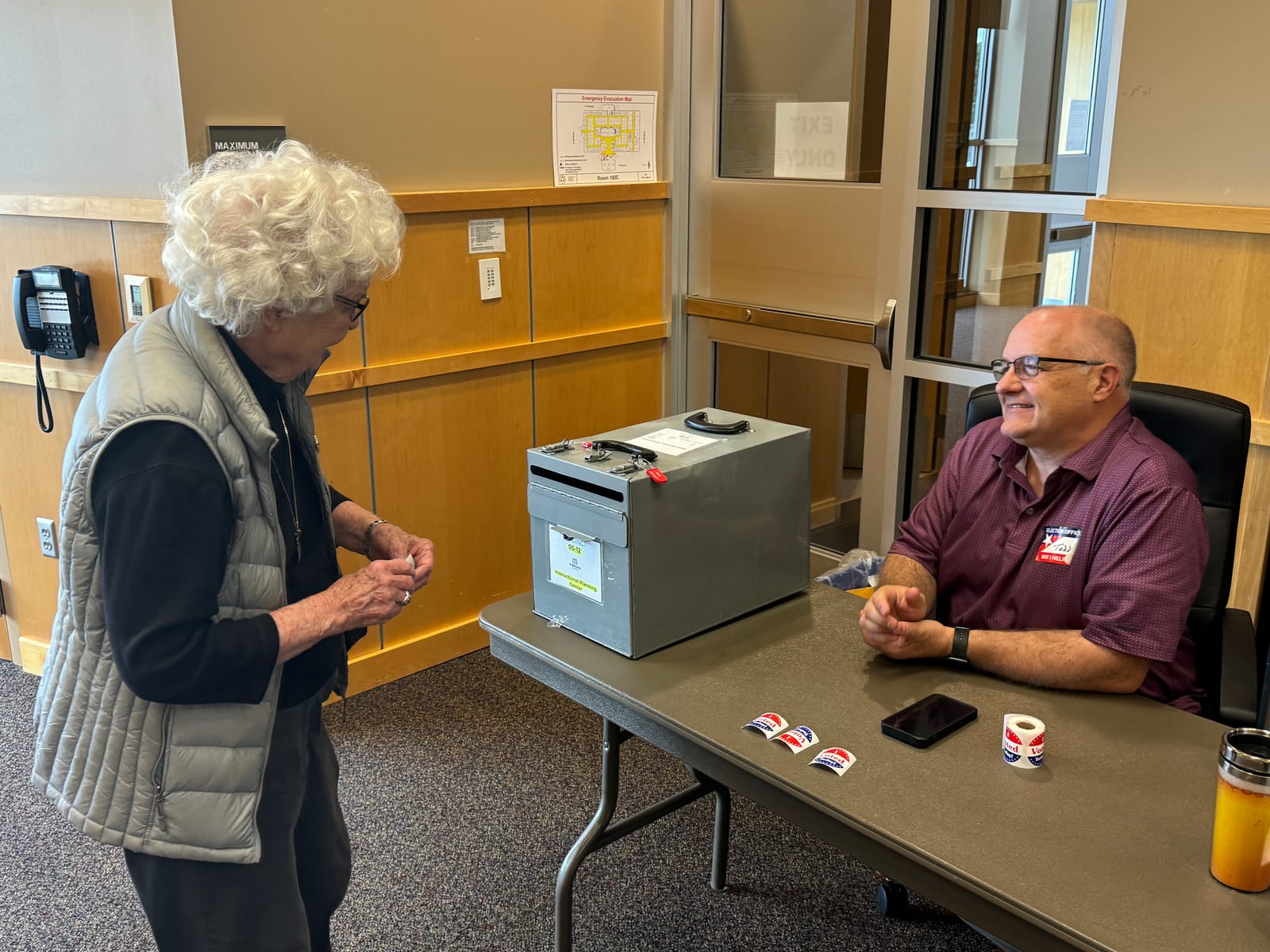Fewer than 2 out of 10 South Dakota voters went to the polls Tuesday in a primary election dominated by fallout from a legislative debate over landowner rights, which caused Republican turnover and set the tone for power clashes in Pierre.
The turnout was historically low, with 101,062 ballots cast out of 591,153 registered voters in the state. That's a percentage of 17%, below the state's primary turnout in presidential cycles of 2020 (28%), 2016 (22%) and 2012 (21%).
The state's largest county, Minnehaha, had a voting turnout Tuesday of 10%.
Part of the reason is that the Republican and Democratic presidential nominees are already decided, and there were no U.S. Senate or U.S. House primaries to spark voter interest.
In 2008, when the Democratic presidential primary race was still roiling between eventual winner Barack Obama and Hillary Clinton, South Dakota's voter turnout was 37%, including 51% among Democrats.
On Tuesday, as in recent years, state legislative primaries were largely Republican exercises, with pro-business moderates and Freedom Caucus-style conservatives fighting for control of the state's dominant party.
Of the 100,999 ballots cast, just 19,869 were from Democratic or Independents voters, who are not permitted to vote in GOP primaries in South Dakota. There was only one Democratic primary in the state legislative races, compared to 44 on the Republican side.
Much of the discrepancy can be attributed not only to South Dakota's status as a deep-red state but also a dearth of competitive Democratic candidates, said Jon Schaff, a political science professor at Northern State University in Aberdeen.

GOP primary winners ran unopposed in 21 of the 35 state Senate races in 2022, and the last time a Democratic candidate won a statewide election was 2008.
"There's an argument to make that we see low turnout for these primaries because so many voters have little or nothing to vote for," said Schaff. "But shame on the Democrats. If you don't want the Republican primaries to be everything, then run a candidate. That's the bare minimum that political parties should be able to do."

Joe Kirby, an election reform advocate who is leading a 2024 ballot effort to make South Dakota an open primary state, agrees that state Democratic efforts need to be more robust.
But he also saw Tuesday's election results and low turnout as indicative of a system that is shutting too many voters out of the process.
Constitutional Amendment H, which has been certified for the Nov. 5 ballot, would establish “top-two” open primaries for governor, Congress and state legislative and county races. There would be one primary election for each designated office, with all candidates running against each other regardless of party affiliation. The top two vote-getters would advance to the general election.

Supporters of the amendment believe circumstances have shifted in their favor due to the power schism in state GOP ranks, which has rankled the moderate wing of the party.
"Our current system can produce odd and unpopular results because only a small group of voters participate or are allowed to participate," said Kirby. "Open primaries will change that."
Landowner rights for the win
Of the 38 Republican legislative incumbents who ran to keep the same position Tuesday, 11 were defeated, foiled in many cases by a pipeline debate that surrounds the expansion of ethanol interests in South Dakota.
The issue of "landowner rights" was inflamed by proposed use of eminent domain for underground carbon pipeline projects that would capture the toxic gas from ethanol plants and carry it to other states for disposal.
It found a legislative litmus test with Senate Bill 201, part of a “Landowner Bill of Rights" compromise supported by Gov. Kristi Noem, who said it would "provide new protections for landowners and allow for economic growth to move forward."
The legislation allows the Public Utilities Commission to override county, municipal or township regulations on pipelines. Critics saw it as a sellout to the ethanol industry and made their voices heard during the primary campaign.
Among the incumbents who voted for Senate Bill 201 and lost their seats Tuesday were Sen. Jean Hunhoff of Yankton, whose 24 years in the state Legislature included 18 on the Joint Committee on Appropriations. She lost a primary challenge to Lauren Nelson in District 18.
Other incumbent casualties in the Senate who voted for SB 201 were Erin Tobin of Winner (District 21), David Johnson of Rapid City (District 33) and Michael Walsh of Rapid City (District 35).
In the House, the list included Tamara St. John of Sisseton (District 1), Byron Callies of Watertown (District 5), Tyler Tordsen of Sioux Falls (District 14), James Wangsness of Miller (District 23), Gary Cammack of Union Center (District 29) and Becky Drury of Rapid City (District 34).
"Clearly there was some power and a movement there," said Schaff, adding that the pipeline issue sparked increased spending in key races. "And the pretty clear lesson is that landowner rights on the whole was a winning message."
In one of the Senate's fiercest anti-pipeline vs. establishment battles, former House member Carl Perry ousted Katie Washnok, president of the Aberdeen Chamber of Commerce Board of Directors and chairman of the Brown County Republicans, by a 52% to 48% margin in District 3.
Kevin Jensen of Canton, shifting from House to Senate in District 16 and criticizing pipeline and prison projects, trounced bank executive and former school board member Eric Hohman with 65% of the vote in the Lincoln County showdown.
In the end, though, not all was lost for mainstream Republicans.
Stephanie Sauder, a longtime educator and former mayor of Bryant, ousted fellow House member Fred Deutsch of Florence in a closely-watched race for District 4 Senate with 51%, a margin of 64 votes subject to possible recount.
Deutsch, a retired chiropractor, has built a political profile around anti-transgender legislation such as the bathroom bill of 2016 that aimed to bar trans students from using school restrooms that don't match their biological sex. The measure made national headlines and was vetoed by then-Gov. Dennis Daugaard.
Noem, who has talked publicly about Sauder babysitting her as a farm kid in Castlewood, remained neutral in this race. But Sauder was supported by Senate Majority Leader Casey Crabtree and House Speaker Hugh Bartels as well as now-retired Senate President Pro Tem Lee Schoenbeck.

Another heavily boosted establishment candidate, Amber Hulse of Hot Springs, prevailed in Senate District 30 by knocking off embattled incumbent Julie Frye-Mueller of Rapid City by a 46% to 42% margin.
Hulse, a former Miss South Dakota who interned at the White House during the Trump administration and has a law degree from Georgetown University, campaigned on bringing “fresh leadership” to one of the state's most conservative districts.
Frye-Mueller was censured by the Senate in February 2023 for workplace harassment involving a Legislative Research Council staffer. The staffer said Frye-Mueller harshly criticized the staffer's decision to have her baby vaccinated, saying the baby could "get Down syndrome or autism" or even die.
"I think Hulse was clearly being put up by the establishment as the 'Frye-Mueller killer,'" said Schaff. "And she was successful in doing that."
Hand-counting initiatives fall short
In addition to legislative races, there were other signs that landowner rights and the location of pipelines and prisons have supplanted election skepticism as hot-button issues galvanizing the Republican right.
Spurred by electoral activist group South Dakota Canvassing, three counties (Gregory, Haakon and Tripp) voted on initiated measures on whether elections should be conducted by paper ballots only, with no electronic voting devices or tabulators.
Voters rejected the measure in all three counties, with Haakon voting 61% against, Tripp 57% against and Gregory 54% against.
“The results showed that our citizens are confident in how elections are conducted in Haakon County,” Stacy Pinner, the county’s auditor and top election official, told News Watch. “Our county commissioners attended town halls that I conducted and they’re listening to our citizens' concerns."

Rick Weible, a computer analyst from Elkton and one of the state’s most persistent election reformers, ran for District 8 Senate against Crabtree and lost by a margin of 72% to 28%.
The day after the election, Weible was driving to Texas to consult with candidates who are challenging voting results in that state. He told News Watch in a phone interview that he has no intention of challenging his lopsided loss to Crabtree.
“I ran to give voters a chance to have more options,” said Weible, a Minnesota native who serves as an adviser to South Dakota Canvassing. “I’m glad that we live in a country where we can have challengers test the waters to find out if public officials are heading in the right direction or not. The voters in this district chose Crabtree, and I respect their decision.”
Matthew Monfore, an evangelist and election skeptic from the West River town of Oral, ran for District 30 House in a crowded Republican field and finished with 4% of the vote.
Biden hits 75% in Democratic primary
Republican nominee and former president Donald Trump faced no opposition in South Dakota, which meant no GOP presidential primary on the ballot.
On the Democratic side, President Joe Biden was opposed by Dean Phillips, Marianne Williamson and Armando Perez-Serrato, with no “uncommitted” or write-in option.
Biden garnered 13,366 of the 17,922 ballots cast by Democratic and Independent voters to win with 75%, followed by Williamson (12%), Phillips (10%) and Perez-Serrato (4%).
The incumbent president hit 79% in the state's largest county, Minnehaha, which gave him 44% of the general election vote in 2020 against Trump.
A May 2024 poll co-sponsored by News Watch showed Trump ahead of Biden by nearly 20 points in South Dakota, with a margin of 50% to 31%. Third-party challenger Robert Kennedy Jr., who is not yet on the ballot in the state, polled at 11% percent, while 7% were undecided.
The last Democrat to finish within 10 points of a Republican nominee in a South Dakota presidential election was Barack Obama, whose 48% came up short against John McCain's 53% in 2008. Obama won the presidency.
The Associated Press contributed to this story that was produced by South Dakota News Watch, a nonpartisan, nonprofit news organization. Read more in-depth stories at sdnewswatch.org and sign up for an email every few days to get stories as soon as they're published. Contact Stu Whitney at stu.whitney@sdnewswatch.org








